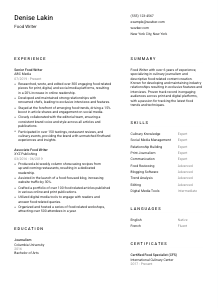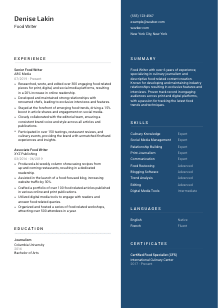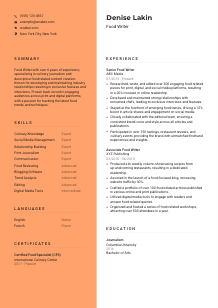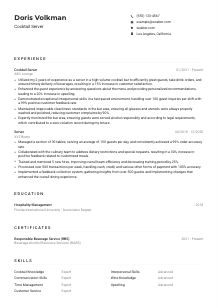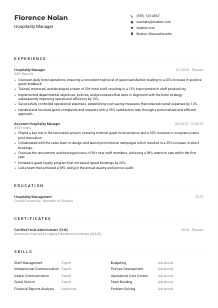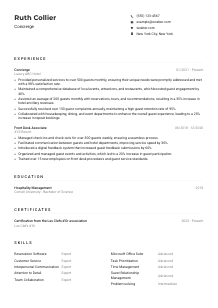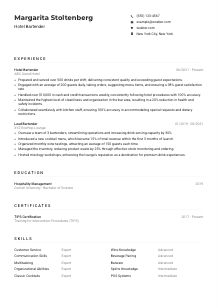Food Writer Resume Example
Serving up delicious reads, but your resume lacks flavor? Sample this Food Writer resume example, whipped up with Wozber free resume builder. See how swiftly you can blend your literary palate with editorial expectations, making your career as delectable as the dishes you describe!
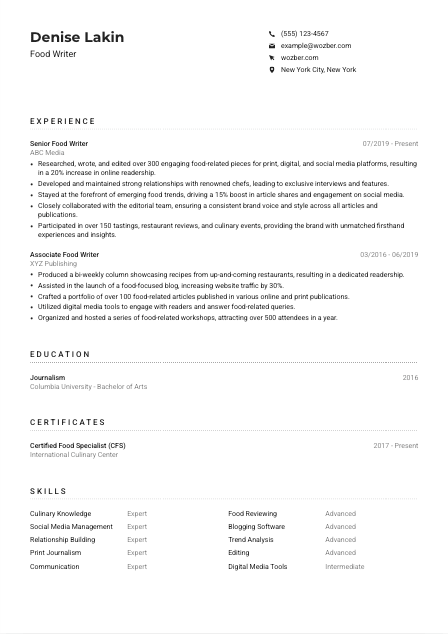
How to write a Food Writer Resume?
Hello, aspiring Food Writer! Let's embark on a flavorful quest to create a resume that doesn't just list your experiences but tells the story of your culinary journey. This guide, crafted with insights from the experts at Wozber, is your secret ingredient to designing a resume perfectly tailored for your dream Food Writer role. Ready to whisk through? Let's create a masterpiece that combines your literary and culinary skills, as savory to hiring managers as your favorite dish!
Personal Details
Just like the contact info on your personal food blog, the Personal Details section of your resume is where the journey begins. Here's how to make it as inviting as the aroma of freshly baked bread.
1. The Name That Whets Appetites
Your name is the title of your culinary narrative. Envision it in a font that's easy on the eyes but distinct, like the memorable typography on a gourmet restaurant's menu, to leave a lasting impression from the get-go.
2. Serve It Hot with the Job Title
"Food Writer" isn't just your aspiration; it's your identity. Plating it right below your name tells the hiring chef—we mean manager—that you're exactly what they've been craving.
3. Contact Information: The Reservation Line
Imagine your phone number and professional email as the reservation lines to your expertise. Are they open and clear, ensuring no missed connections? And remember, a food writer's email is best when it's simple and professional—like a perfectly plated dish.
4. Location: The Cuisine's Origin
A strong sense of place can elevate a dish, and the same goes for your resume. By highlighting "New York City, New York," you're not just matching the job's location requirement; you're affirming your local culinary scene knowledge and network.
5. Online Presence: Your Digital Tasting Menu
Including links to your professional online profiles or personal food blog can act as a tantalizing tasting menu for your skills. Make sure these platforms showcase the best of your food writing and culinary adventures.
Takeaway
Think of the Personal Details section as the amuse-bouche of your resume—small but mighty, setting the stage for the feast of qualifications that follows. Get this right, and you'll have the hiring manager eager for the next course!





Experience
Your Experience section is the main course of your resume, rich with flavors of your career journey. Here's how to make each bullet point a bite worth savoring.
- Researched, wrote, and edited over 300 engaging food‑related pieces for print, digital, and social media platforms, resulting in a 20% increase in online readership.
- Developed and maintained strong relationships with renowned chefs, leading to exclusive interviews and features.
- Stayed at the forefront of emerging food trends, driving a 15% boost in article shares and engagement on social media.
- Closely collaborated with the editorial team, ensuring a consistent brand voice and style across all articles and publications.
- Participated in over 150 tastings, restaurant reviews, and culinary events, providing the brand with unmatched firsthand experiences and insights.
- Produced a bi‑weekly column showcasing recipes from up‑and‑coming restaurants, resulting in a dedicated readership.
- Assisted in the launch of a food‑focused blog, increasing website traffic by 30%.
- Crafted a portfolio of over 100 food‑related articles published in various online and print publications.
- Utilized digital media tools to engage with readers and answer food‑related queries.
- Organized and hosted a series of food‑related workshops, attracting over 500 attendees in a year.
1. Decoding the Recipe
Analyze the job description like a complex recipe. Highlight ingredients—skills, duties, and experiences—that you need to include in your resume. This ensures that every line of your Experience section complements the role's flavor profile.
2. Presenting the Dish
Organize your experiences like a well-structured menu, starting with your most recent role. Make sure each position includes your title, place of employment, and the dates you delighted palate there.
3. Descriptive and Engaging Ingredients
Detail your accomplishments in each role with the richness and depth you'd use in describing a gastronomic delight. For example, "Researched, wrote, and edited over 300 engaging food-related pieces..." not only shows volume but teases the senses with the promise of variety.
4. Quantifying the Delights
Use quantifiable achievements to give a tangible sense of your impact. A "20% increase in online readership" offers a measurable taste of your ability to entice and engage readers.
5. Keeping the Menu Relevant
Focus on the roles and projects most relevant to a Food Writer position. Even if you were a champion barista, unless it adds a unique flavor to your culinary storytelling, save that story for the interview.
Takeaway
Your experience section should offer a mouthwatering menu of your culinary writing journey. It's about showing not only where you've been but how those experiences have seasoned your skills, making you irresistible to potential employers.
Education
In the rich tapestry of your Food Writer resume, the Education section is akin to understanding the terroir of your favorite wine—it provides context and depth. Here's how to cultivate it.
1. Pinpointing the Key Ingredients
Begin with the main ingredient—the degree the job description specifically requests. Your "Bachelor's degree in Journalism" isn't just a requirement; it's a testament to your grounding in the craft of storytelling.
2. Structure with Elegance
Keep this section as refined and readable as a menu at a Michelin-star restaurant. Present your degree, the institution, and graduation date in a manner that's easy to digest.
3. Adding a Dash of Specialization
If your culinary journey includes any specialization relevant to food writing, such as a culinary arts certification, it's worth highlighting. It adds a unique flavor to your scholarly pursuits.
4. Culinary Electives and Workshops
For those early in their career or with a particularly relevant coursework or workshop experience, including these can enhance the flavor profile of your Education section.
5. Recognizing Other Palatable Achievements
Additional seasoning like honors or relevant extracurriculars can illustrate your multifaceted interests and commitment to the culinary world, but measure these ingredients carefully to ensure they enhance rather than overwhelm.
Takeaway
Your Education section delineates the foundation of your culinary and journalistic journey. It shows not just where you began, but how every step has prepared you to be the Food Writer you aspire to be.
Certificates
Certificates in a Food Writer resume are like those special certifications a restaurant displays proudly—indications of specialized skills and dedication to the craft. Let's savor how to include these.
1. Sorting through the Pantry
Look through your certificates—though the Food Writer job may not require specific certifications, including relevant ones like a "Certified Food Specialist (CFS)" subtly reinforces your expertise and passion.
2. Selecting the Crème de la Crème
Choose certifications that directly spice up your culinary narrative. Quality here beats quantity; focus on those that most closely align with your food writing prowess.
3. Freshness Counts
Update your credentials and include dates where relevant. This showcases an ongoing commitment to staying sharp in your field, much like a chef keeping abreast of the latest culinary trends.
4. Always Seasoning
The culinary world is ever-evolving, and so should your certificates. Continuously seek out new learning opportunities, especially those that refine your palette and writing.
Takeaway
Certificates on your resume are like the Michelin stars of your professional journey. They highlight your dedication to the culinary arts and food writing, hinting at the depth of flavor you bring to the table.
Skills
The Skills section of your Food Writer resume is your spice rack—every ingredient has its place and purpose. Let's ensure you're using just the right ones for the dish you're preparing.
1. Extracting the Essence
Start by identifying the key skills mentioned in the job description. Culinary knowledge, proficiency in digital media, and an ability to engage readers are prime examples. These are the essential flavors that will make your resume stand out.
2. Measuring the Portions
List skills that directly align with the job's requirements, balancing hard skills like digital media proficiency with soft skills like relationship building. Remember, a well-balanced palette is key to a memorable dish.
3. Presentation is Everything
Organize your skills in a way that's appetizing to the recruiter. Keep it neat, prioritizing the skills that best showcase your suitability for the role, like a chef arranging a plate for maximum impact.
Takeaway
Just like in cooking, the right mix of skills can transform good writing into something unforgettable. Tailor this section to reflect the unique blend of ingredients that make you the perfect candidate for the Food Writer role.
Languages
Your ability to navigate different languages can be a unique asset, much like a chef's ability to fuse cuisines from around the world. Let's articulate how this section can add global savor to your resume.
1. Assessing the Menu
First, understand if the job description points out any language preferences. For a Food Writer, being multilingual might not be a strict requirement, but it showcases a global palate that can enrich your writing.
2. Prioritizing Languages
List languages in order of relevance to the job or your culinary specialty. Even if not explicitly required, additional languages can season your resume with an international flair.
3. Including Other Dialects
Beyond those directly relevant, include other languages you're proficient in. This highlights your versatility and ability to engage with a broader audience.
4. Honest Self-Assessment
Be straightforward about your proficiency levels. Whether you're "Fluent" in French or have "Basic" Italian, an honest reflection of your language skills adds integrity to your resume.
5. Connecting Cultures
For a role that might have international ramifications or involves exploring global cuisines, your language skills could be a standout asset, enriching your narrative with multicultural insights.
Takeaway
Languages are the seasoning that can internationalize your appeal as a Food Writer. Embrace and showcase your linguistic abilities as part of your unique culinary and literary identity.
Summary
Your summary is the irresistible aroma that draws readers in—a succinct blend of your career highlights and skills. Let's craft a summary that makes hiring managers hungry for more.
1. Tasting the Dish
Begin by absorbing the essence of the job. Understand what the role entails and the flavors it's seeking.
2. The First Bite
Introduce yourself with a statement that encapsulates your professional identity as a Food Writer. Highlight your years of experience and the unique vantage point you bring to the table.
3. Adding the Spices
Infuse your summary with key skills and experiences that align with the job description. Terms like "culinary knowledge" and "digital media proficiency" should be peppered throughout, drawing on tangible achievements like a "20% increase in online readership."
4. Perfect Plating
Keep it concise, but make every word count, much like a meticulously plated dish. This isn't the place for the entire recipe, just enough to entice the hiring manager to want more.
Takeaway
Your Summary is the invitation to the feast that is your resume. Make it as compelling as the introduction to your favorite cookbook, and watch as hiring managers are eager to dive into the details.
Launching Your Food Writer Journey
With these detailed steps, using the Wozber free resume builder, you're now equipped to craft an ATS-compliant resume that resonates with hiring managers. This tool simplifies the process, ensuring your resume is not just ATS-friendly but a mouthwatering proposition that hiring managers can't overlook. From using an ATS-friendly resume template to fine-tuning each section with precise, engaging content, your resume is ready to serve.
Let Wozber be your sous-chef in this culinary career journey, helping you plate a Food Writer resume that's as compelling as the cuisines you love to write about. Now, roll up your sleeves—your next big opportunity awaits!

- Bachelor's degree in Journalism, English, or a related field.
- Minimum of 3 years experience in food writing, culinary journalism, or related fields.
- Strong culinary knowledge and the ability to write about food in a descriptive and engaging manner.
- A portfolio that showcases a variety of food-related articles and publications.
- Proficiency in digital media tools and platforms, including blogging software and social media.
- Must be located in New York City, New York.
- Research, write, and edit engaging food-related content for multiple platforms, including print, digital, and social media.
- Develop and maintain relationships with chefs, restaurateurs, and other sources within the culinary industry.
- Stay updated on emerging food trends, techniques, and chefs within the global culinary landscape.
- Collaborate with the editorial team to ensure consistency in voice, style, and content.
- Participate in tastings, restaurant reviews, and culinary events to provide firsthand experiences and insights in writing.





